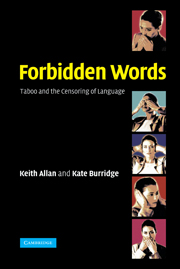Book contents
- Frontmatter
- Contents
- List of figures
- Acknowledgements
- 1 Taboos and their origins
- 2 Sweet talking and offensive language
- 3 Bad language? Jargon, slang, swearing and insult
- 4 The language of political correctness
- 5 Linguistic purism and verbal hygiene
- 6 Taboo, naming and addressing
- 7 Sex and bodily effluvia
- 8 Food and smell
- 9 Disease, death and killing
- 10 Taboo, censoring and the human brain
- Notes
- References
- Index
4 - The language of political correctness
Published online by Cambridge University Press: 03 December 2009
- Frontmatter
- Contents
- List of figures
- Acknowledgements
- 1 Taboos and their origins
- 2 Sweet talking and offensive language
- 3 Bad language? Jargon, slang, swearing and insult
- 4 The language of political correctness
- 5 Linguistic purism and verbal hygiene
- 6 Taboo, naming and addressing
- 7 Sex and bodily effluvia
- 8 Food and smell
- 9 Disease, death and killing
- 10 Taboo, censoring and the human brain
- Notes
- References
- Index
Summary
What is it exactly that people mean when they say something is ‘politically correct’? Noam Chomsky once described it as a ‘healthy expansion of moral concern’. Michael Barnard viewed it as a ‘new strain of ideological virus’. For Morris Dickstein, it was a ‘dictatorship of the well-meaning and pure of heart’ and for Eugene Goodheart a ‘doctrine of opportunism’. Perhaps the whole thing has been an illusion, as Ruth Perry put it, a ‘will-o'-the-wisp on the murky path of history’. Sometimes political correctness seems more like an urban myth, with stories of the differently hirsute (‘hairy’), the specially non-tall (‘short’) and the chronologically gifted (‘old’) reminiscent of those widely circulated anecdotes about batter-fried rats, poodles in microwaves, spiders in hairdos and alligators in the sewers of New York. The term is hopelessly inexact and with so much polemical baggage on board, its meaning seems to change every time it makes an appearance.
We consider political correctness as a brainwashing programme and as simple good manners; and we examine the interaction of PC-inspired relabelling initiatives with notions of taboo and censoring. Because it is politically driven, political correctness will obviously attract more attention, and certainly more hostility, than most acts of linguistic censoring. We assume that PC language reflects, and also seeks to enforce, social change. Nonetheless, speakers typically dislike being told to change their linguistic habits, which they see as an attempt to manipulate their thinking.
- Type
- Chapter
- Information
- Forbidden WordsTaboo and the Censoring of Language, pp. 90 - 111Publisher: Cambridge University PressPrint publication year: 2006



